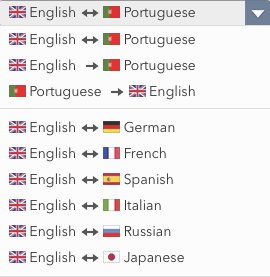Leading Tips for Perfect English to Portuguese Translation Provider
Attaining exceptional English to Portuguese translation calls for even more than simple word-for-word conversion; it demands an understanding of cultural nuances and etymological ins and outs. Choosing qualified translators that are both proficient and culturally aware is paramount - English To Portuguese Translation. What various other important elements should be considered to boost translation quality better?
Understand Cultural Nuances
When converting from English to Portuguese, understanding the social nuances is essential for creating a resonant and exact text. The Portuguese-speaking globe is diverse, including various areas, each with its distinct personalizeds, idioms, and social standards. A translator should be in harmony with these subtleties to ensure that the translation not just conveys the desired message but additionally resonates with the target market.
As an example, idiomatic expressions in English might not have straight counterparts in Portuguese. An expression that works well in one culture can result in complication or misinterpretation in an additional. Understanding regional languages and variants, such as those found in Brazil and Portugal, is vital; words might hold various undertones or usages depending upon the place.
In addition, social context plays a considerable duty in translation. Inevitably, a complete understanding of cultural subtleties is essential for delivering translations that are not just linguistically exact yet additionally culturally pertinent and interesting.
Pick Certified Translators
Picking certified translators is a critical action in ensuring the accuracy and quality of English to Portuguese translations. A translator's experience not just incorporates language effectiveness however likewise a deep understanding of cultural context, idiomatic expressions, and industry-specific terminology. When picking a translator, focus on those with official training in translation researches or grammars, in addition to relevant accreditations that demonstrate their specialist skills.
Experience plays an essential function as well; translators specializing in specific areas-- such as legal, clinical, or technological-- are more probable to supply exact translations tailored to the industry's criteria (English To Portuguese Translation). Furthermore, consider their portfolio and customer testimonies to examine their previous job high quality and dependability
Engage translators that are indigenous Portuguese speakers, as they have an innate understanding of the language's nuances and local dialects. This knowledge improves the translation's authenticity and performance.
Use Contextual Referrals

When converting, it is important to identify idiomatic expressions and social references that may not have straight matchings in Portuguese. Particular phrases that resonate in English may need adjustment to share the same emotional weight or cultural relevance in Portuguese. Using contextual references can help translators select the ideal terms and design, thereby enhancing the general clarity and effect of the translation.

Concentrate On Localization
Localization plays a crucial role in the translation process from English to Portuguese, as it guarantees that the converted material is culturally proper and appropriate to the target market. English To sites Portuguese Translation. This process exceeds plain translation; it entails adapting the content to the social, social, and etymological subtleties details to Portuguese-speaking regions
Comprehending local expressions, custom-mades, and preferences is essential. Particular phrases or references that reverberate with an English-speaking target market may not have the exact same influence on Portuguese audio speakers. It is important to think about local variations, such as Brazilian Portuguese versus European Portuguese, as each has distinct vocabulary and stylistic distinctions.
In addition, localization encompasses format, such as day and time styles, currency, and measurement devices, which can differ substantially across cultures. This interest to information fosters a link with over here the target market, enhancing interaction and understanding.
Moreover, utilizing neighborhood dialects and jargon can provide authenticity, making the material extra relatable. By concentrating on localization in English to Portuguese translation, services can properly communicate their message, build depend on with their target market, and ultimately achieve their designated purposes.
Review and Edit Thoroughly
Thorough review and modifying are crucial steps in the translation process, particularly when converting English material into Portuguese. This stage makes certain that the equated product not only maintains the original significance however additionally reverberates well with the target market. Offered the etymological and social subtleties, a careful strategy to assess and editing and enhancing is essential.
Begin by contrasting the initial English text with the Portuguese translation, paying very close attention to tone, context, and terminology. It's vital to make certain that cultural referrals and colloquial expressions are appropriately adjusted for the Portuguese target market. Involving a second translator or an indigenous audio speaker for this evaluation process can offer vital insights and catch errors that may have been neglected.
Additionally, look for grammatic accuracy and stylistic uniformity throughout the paper. Usual challenges such as ambiguous expressions or incorrect cognates need to be dealt with to avoid false impression.
Conclusion
Attaining outstanding English to Portuguese translation solutions necessitates a thorough method that includes understanding cultural subtleties, choosing qualified translators, making use of contextual recommendations, prioritizing localization, and performing complete reviews and edits. Each component plays a critical function in making sure that translations are not only exact but additionally resonate with the target market. By implementing these approaches, organizations can enhance the efficiency of their interaction and promote a much deeper connection with Portuguese-speaking target markets.
Achieving remarkable English to Portuguese translation calls for more than simple word-for-word conversion; it requires an understanding of cultural subtleties and you could check here linguistic details.Selecting qualified translators is a critical step in making certain the accuracy and high quality of English to Portuguese translations.Comprehensive testimonial and editing and enhancing are important actions in the translation process, specifically when transforming English content into Portuguese.Begin by contrasting the initial English message with the Portuguese translation, paying close attention to tone, terminology, and context.Attaining extraordinary English to Portuguese translation solutions necessitates an extensive technique that incorporates understanding social subtleties, picking qualified translators, using contextual recommendations, focusing on localization, and performing thorough evaluations and edits.